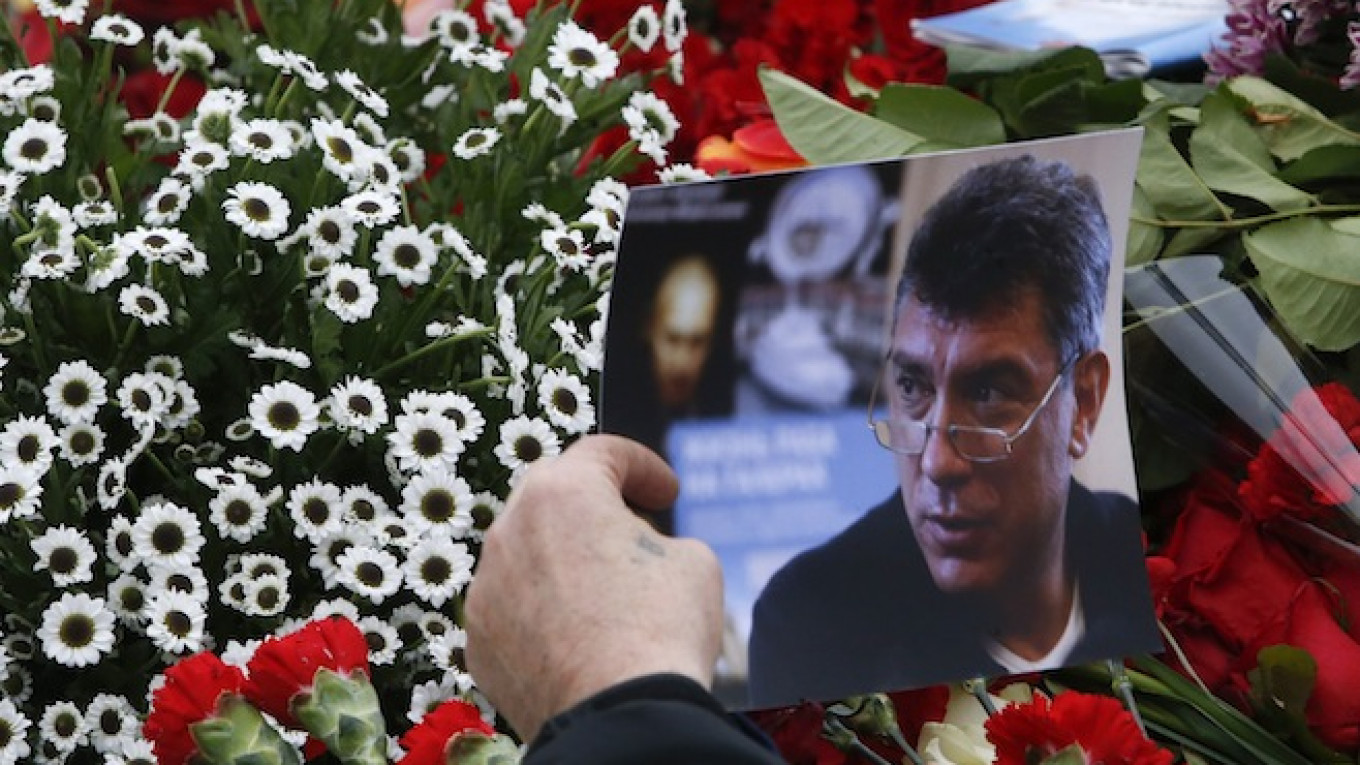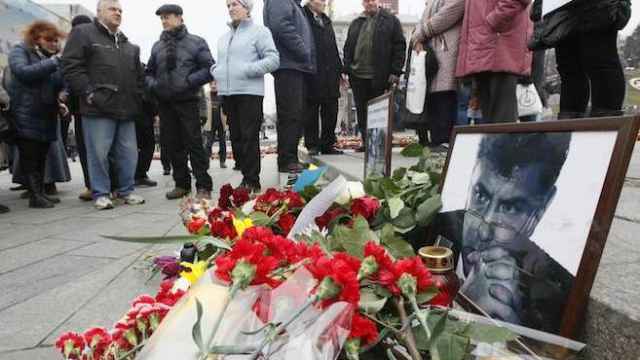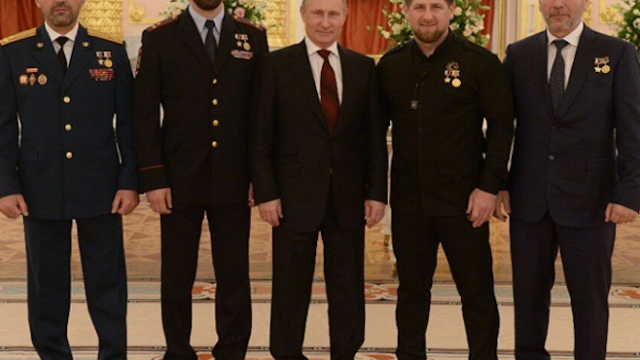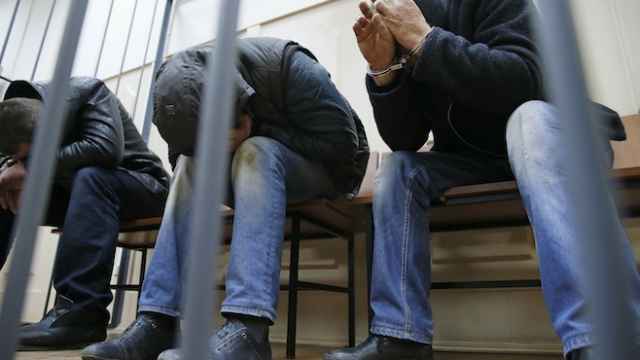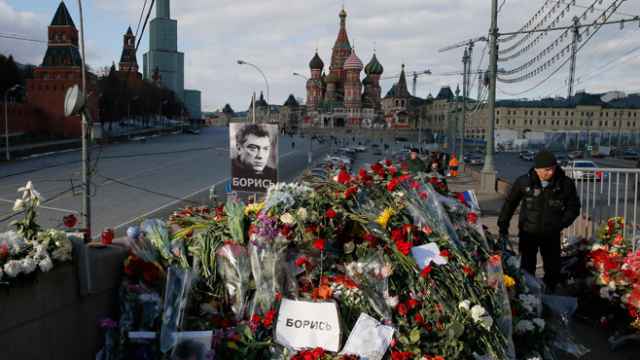The claim that Nemtsov was shot dead by a devout Muslim who reportedly felt insulted by the politician's support for French satirical magazine Charlie Hebdo, has been denounced in some Russian media as an attempt to disguise the roots — and reverberations — of the Feb. 27 gunning.
Prosecutors have charged two men, Zaur Dadayev and Anzor Gubashev, with involvement in Nemtsov's killing, and are holding three others as suspects. Officials say Dadayev, who used to be a commander in the Chechen police's "Sever" battalion, has admitted involvement.
Pro-Kremlin tabloid MK reported on Tuesday that footage from surveillance cameras showed the suspects had been tailing Nemtsov since last autumn, before the January attack against Charlie Hebdo even took place.
The report did not cite any sources, but some pundits have suggested the Kremlin-loyal tabloid is reflecting the stance of specific forces within law enforcement or the Federal Security Service, the FSB.
"Conspiracies, of course. But looks like some FSB guys don't want the investigation to fizzle out," opposition leader Alexei Navalny, currently under house arrest, said on Twitter, linking to the MK report.
Navalny echoed suggestions that some forces within the FSB have discarded the theory that Islamic extremists acted on their own accord and are trying to point to higher-level involvement in the murder.
The Islamist motive has been approached with skepticism from the very beginning — while Nemtsov had been a vocal critic of the Kremlin, he was hardly known for criticizing Islam.
Power Struggle
Some Russian media and social network commenters see an alternative explanation for the Charlie Hebdo murder theory, suggesting the FSB is seeking to link the Nemtsov killing to Chechnya's leader Ramzan Kadyrov — a man who has been bestowed with broad powers to rule the Northern Caucasus republic in exchange for staunch loyalty to Putin.
Russian journalist Orkhan Dzhemal, the founder of a Muslim journalist association, said in an interview with Ekho Moskvy liberal radio station this week that FSB chief Alexander Bortnikov had supposedly sought to erode Kadyrov's close ties with Putin when he identified the former Chechen policeman, Dadayev, as one of the main murder suspects.
"Bortnikov dealt a blow against Kadyrov," Dzhemal said. "We understand only one thing, that now the FSB is pointing at [Kadyrov]. This what is happening is all pointing towards him."
Dzhemal said the emergence of Kadyrov in the investigation signals a power struggle between two Kremlin beacons.
"There's a battle going on. The Spasskaya [Tower] is fighting against Borovitskaya," he added, metaphorically referring to two of Red Square's landmarks, not far from where Nemtsov was gunned down.
More Speculation
On a different side of the political and journalistic spectrum from the MK tabloid, independent Novaya Gazeta weekly reported Wednesday that the organizers of Nemtsov's murder allegedly included high-ranking Chechen security officials.
The report, which did not cite any sources, identified one of the alleged organizers as Ruslan, adding that the man was a major and that his last name was known to "dozens, if not hundreds" of Russian security officials.
The FSB may have a reason to see Kadyrov's powers diminished — the security agency's clout in the North Caucasus has reportedly shrunk, even as the Chechen leader's control has increased.
"Law enforcement and the secret services have been repeatedly humiliated for the sake of 'political stability' in the Caucasus," Novaya Gazeta said in its article.
The Blame Game
Chechnya's leader, Kadyrov, meanwhile, seemed to moderate his version of events as new information about the brutal killing emerged.
Before the FSB had identified any suspects, Kadyrov said the killing was clearly the work of "Western secret services."
When Dadayev, the Chechen suspect, was detained, Kadyrov responded with another online post, praising the man as a "true Russian patriot" and as a devout Muslim, who had felt insulted by the Charlie Hebdo publications.
State Honor
Even amid the supposed attempts to undermine Kadyrov's position, Putin this week awarded the Chechen leader one of the nation's highest awards, the Order of Honor, citing his "professional accomplishments, social activities and many years of diligent work."
Many in Russia saw the award as an indication of Putin's intention to stand by his Chechen protege.
While the awards list would have been finalized far in advance, before the murder, "if the question of [Kadyrov's position] remained open, and not closed, the announcement of that award would have been held back," Dzhemal, the journalist, told Ekho Moskvy.
The appeal to "patriotism" could prove to be a decisive factor in the outcome of the supposed FSB-Kadyrov power struggle, Novaya Gazeta said.
"Two buttresses of the Kremlin have clashed head on, forcing the Russian leadership to decide who is a true patriot and who is not, and who to rely on in the context of the ongoing complicated political situation," Novaya Gazeta wrote.
A Message from The Moscow Times:
Dear readers,
We are facing unprecedented challenges. Russia's Prosecutor General's Office has designated The Moscow Times as an "undesirable" organization, criminalizing our work and putting our staff at risk of prosecution. This follows our earlier unjust labeling as a "foreign agent."
These actions are direct attempts to silence independent journalism in Russia. The authorities claim our work "discredits the decisions of the Russian leadership." We see things differently: we strive to provide accurate, unbiased reporting on Russia.
We, the journalists of The Moscow Times, refuse to be silenced. But to continue our work, we need your help.
Your support, no matter how small, makes a world of difference. If you can, please support us monthly starting from just $2. It's quick to set up, and every contribution makes a significant impact.
By supporting The Moscow Times, you're defending open, independent journalism in the face of repression. Thank you for standing with us.
Remind me later.


